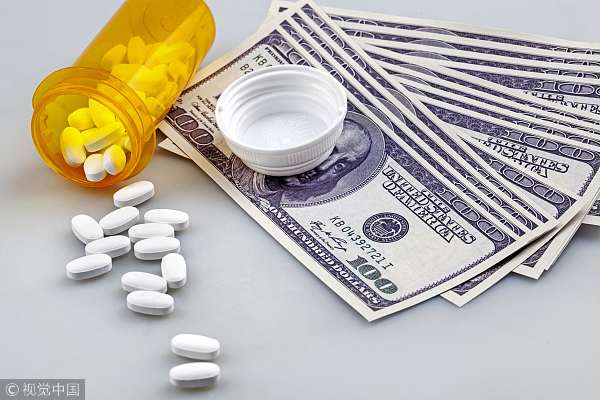New tariffs on China may raise US drug prices
By ZHANG RUINAN in New York | chinadaily.com.cn | Updated: 2018-04-05 09:00

US consumers could face higher prescription drug prices if tariffs proposed by the Trump administration go into effect on dozens of key ingredients made in China and used by pharmaceutical companies.
"We are concerned that the proposed tariffs may lead to increased costs of manufacturing for generics and biosimilars and thus higher prescription drug prices for patients in the US," Jeffrey Francer, senior vice-president and general counsel of the Association for Accessible Medicines, said in a statement on Wednesday. The association represents prescription drug manufacturers.
Ben Wakana, executive director of Patients for Affordable Drugs, a bipartisan organization that supports lower drug prices, said in an email that tariffs on ingredients in drugs would run counter to US President Donald Trump's promise to lower drug prices. "For an administration that wants to lower drug prices, this would do the exact opposite," he said.
"We are eager to read the comprehensive set of recommendations the administration promised to release in the next few weeks, but the tariffs announced would be a step in the wrong direction. It's a tax that would raise prices on prescription drugs," Wakana said.
The Trump administration on Tuesday placed 25 percent tariffs on some 1,300 industrial technology, transport and medical products. The US action targets about $50 billion of estimated 2018 imports and is aimed at hampering China's efforts to upgrade its manufacturing base.
The tariff would be placed on raw drug ingredients such as insulin used by diabetics, the anti-allergic-reaction drug epinephrine as well as vaccines, blood products and antidepressants, according to the list. The tariffs would also target medical devices and diagnostic equipment, including syringes, MRI machines, defibrillators, artificial joints and pacemakers.
According to the US Food and Drug Administration (FDA), more than 80 percent of the ingredients used to make drugs consumed in the US are produced outside the country. China and India account for most of the bulk ingredients, and the FDA has called China a "major provider".
Last year, China exported $29.1 billion worth of active pharmaceutical ingredients globally, according to the China Chamber of Commerce for Import and Export of Medicines and Health Products.
For brand-name drugs, raw ingredients used by manufacturers are typically a tiny fraction of a product's cost. They can be more important for generic medications that are essentially low-cost commodity products. Thus, patients who use generic drugs may see a bump in price as drug makers pass along their increased costs due to the tariffs.
Some drug makers and advocates for patients said they were still assessing the potential impact of the tariffs and they were trying to negotiate with the US Trade Representative.
The Pharmaceutical Research and Manufacturers of America (PhRMA), an advocacy group that represents the pharmaceutical industry, said in an email, "We look forward to working with the administration to ensure that American innovation is protected and valued and that we maintain a robust global environment for innovative medicines."
The US is seeking public comment on the USTR list until May 11 and will hold a public hearing on May 15 in Washington. After that, companies will have until May 22 to file rebuttals.
























